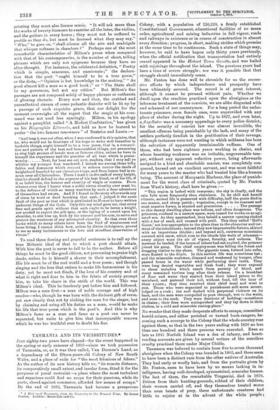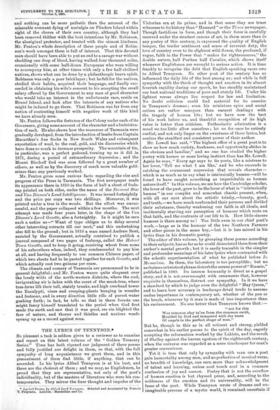TASMANIA AND 1TS VICISSITUDES.* JUST eighty-two years have elapsed—for the
event happened in the spring or early summer of 1803-8ince we took possession of Tasmania, or, as it was then called, Van Diemen's Land, as a dependency of the fifteen-years-old Colony of New South Wales, and a place of exile for "the most felonious of felons." As the author of its new history tells us, "its remote distance, its comparatively small extent and insular form, fitted it for the purposes of penal restraint—a place where the most turbulent and rapacious could find no scope for their passions, while its ports, closed against commerce, afforded few means of escape." By the end of 1883, Tasmania had become a prosperous
• A Histnry of Tamatlia, from its Disoorery to the Present Time. By James Fenton. London Macmillan and Co.
Colony, with a population of 126,220, a firmly established Constitutional Government, educational facilities of no mean order, agricultural and mining industries in full vigour, roads and railways in existence or in course of construction in almost every direction; progress, in short, making strides which promise at the same time to be continuous. Such a state of things may, however, be said to have begun only thirty years previously, when the official notification that transportation had entirely ceased appeared in the Hobart Town Gazette, and was hailed with rejoicings throughout the island. The previous years had been a time of severe struggle ; nor was it possible that that struggle should immediately cease.
Mr. Fenton has done well to chronicle for us the succes- sive efforts by which independence and prosperity have been ultimately secured. The record is of great interest, although it cannot be perused without pain. Whether we dwell upon the cruelties practised upon the aborigines or the inhuman treatment of the convicts, we are alike disgusted with and ashamed of our countrymen. For a long period the unfor- tunate prisoners, even female ones, were nnprovided with any place of shelter during the night. Up to 1827, and even later, a flagella/or was a necessary appendage to every police district; for the severity of convict law was almost incredible, the smallest offences being punishable by the lash, and many of the settlers perfectly fiendish in the gratification of their revenge, although instances were not wanting in which mildness has been the salvation of apparently irreclaimable ruffians. One of these, who had been eighteen years working in chains, and whose besetting weakness was an irritable, ungovernable tem- per, without any apparent reflective power, being afterwards assigned to a kind and charitable master, was completely con- quered, turned out an excellent servant, and was most faithful for many years to the master who had treated him like a human being. The account of Macquarie Harbour, the place of punish- ment for the worst class of criminals, quoted by Mr. Fenton from West's history, shall here be given :—
" This region is lashed with tempests; the sky is cloudy, and the rain falls more frequently than elsewhere. In its chill and humid climate, animal life is preserved with difficulty, half the goats died in one season, and sheep perish ; vegetation, except in its coarsest and most massive forms is stunted and precarious The passage to this dreary dwelling-place was tedious, and often dangerous. The prisoners, confined in a narrow space, were tossed for weeks on an agi- tated sea. As they approached, they beheld a narrow opening choked with a bar of sand, and crossed with peril. This they called
Gates,' not less appropriate to the place than to the character and tor- ment of the inhabitants ; beyond they saw impenetrable forests, skirted with an impervious thicket ; and beyond still, enormous mountains covered with snow, which rose to the clouds like walls of adamant— every object wore the air of vigour, ferocity, and sadness. The moment he landed, if the hours of labour had not expired, the prisoner joined his gang. The chief employment was felling the forest and dragging timber to the shore. The gigantic trees, formed into rafts, were floated to the dep6t. In this service life was sometimes lost ; and the miserable workmen, diseased and weakened by hunger, often passed hours in the water while performing their tasks. They were long denied vegetables and fresh food ; they were exposed to those maladies which result from poverty of blood, and many remained victims long after their release. On a breakfast of flour and water they started from their island prison to the mainland, and pursued their toil, without food, till the hour of their raturn ; they then received their chief meal and went to rest. Those who were separated to punishment still more severe, lodged on a rock ; the surf dashed with perpetual violence on its base, and the men were compelled to pass through, wet to the waist, and even to the neck. They were destitute of bedding—sometimes in chains ; their fires were extinguished and they lay down in their clothes, in a cold and miserable resting-place."
No wonder that they made desperate efforts to escape, committed horrid crimes, and either perished or turned bush-rangers, be- coming such a scourge to the Colony that the whole country rose against them, so that in the two years ending with 1826 no less than one hundred and three persons were executed. Even as late as 1815 Norfolk Island was a den of infamy, and heart- rending accounts are given by several writers of the merciless cruelty practised there under Major Childs.
Tasmania was believed to contain from five to seven thousand aborigines when the Colony was founded in 1803, and these seem to have been a distinct race from the other natives of Australitc They had curly or woolly hair, and from the portraits given by Mr. Fenton, seem to have been by no means lacking in in- telligence, having well-developed, symmetrical, muscular frames. The last of them, the remarkable Truganini, died in 1876.
Driven from their hunting-grounds, robbed of their children, their women carried off, and they themselves treated worse than even beasts of prey, these unfortunate creatures had little to rejoice at in the advent of the white people ; and nothing can be more pathetic than the account of the miserable remnant dying of nostalgia on Flinders Island within sight of the shores of their own country, although they had been removed thither with the best intentions by Mr. Robinson, the aboriginal protector, and treated with the utmost kindness.
Mr. Fenton's whole description of these people and of Robin- son's work amongst them is fall of interest. That this devoted man should have been able to put an end to a savage war without shedding one drop of blood, having walked four thousand miles, occasionally with some half-dozen Europeans who were willing to accompany him, at other times with only a few half-civilised natives, shows what can be done by a philanthropic brave spirit.
Robinson was only a poor bricklayer ; but he felt for the natives, studied their habits, acquired their language, and finally suc- ceeded in obtaining his wife's consent to his accepting the small salary offered by the Government to any man of good character who would take an interest in the unfortunate race, reside on Brune Island, and look after the interests of any natives who might be induced to go there. That Robinson was far from any notion of contenting himself with negative work of this kind we have already seen.
Mr. Fenton follows the fortunes of the Colony under each of its Governors, giving some account of the character and administra- tion of each. He also shows how the resources of Tasmania were gradually developed, from the introd action of lambs from Captain Macarthur's fine flocks in New South Wales and subsequent exportation of wool, to the coal, gold, and tin discoveries which have done so much to increase prosperity. The mountain of tin, in particular, was a perfect godsend, turning up as it did in 1871, during a period of extraordinary depression ; and the Mount Bischoff find was soon followed by a great number of others, as well as by the discovery of much more valuable gold. mines than any previously worked.
Mr. Fenton gives some curious facts regarding the rise and progress of the Press in Tasmania. The first newspaper made its appearance there in 1810 in the form of half a sheet of fools- cap printed on both sides, under the name of the .Derwent Star and Van Diemen's Land Intelligeneer. It was issued fortnightly and the price per copy was two shillings. Moreover, it was printed under a tree in the woods. But the effort was unsuc- cessful, and the paper collapsed within a few months. The next attempt was made four years later, in the shape of the Van Diemen's Land Gazette, also a fortnightly. In it might be seen such a notice as—" Want of type obliges us to delay several other interesting extracts till our next," and this undertaking also fell to the ground ; but in 1816 a man named Andrew Bent, assisted by the Government, actually contrived to publish a journal composed of two pages of foolscap, called the Hobart Town Gazette, and to keep it going, receiving wheat from some of his subscribers when, indeed, they condescended to pay him at all, and having frequently to use common Chinese paper, of which two sheets had to be pasted together for each Gazette, and which actually cost two guineas per ream.
The climate and scenery of Tasmania are pronounced to be in general delightful; and Mr. Fenton waxes quite eloquent over the lovely wilds of the north-western districts, where the cool, invigorating air is laden with the scent of the musk-tree, where tree-ferns lift their tall, stately trunks, and high overhead tower the Eucalypti, vines and creeping-plants hanging in wreaths and festoons, and in every direction little rills of purest water gushing forth ; in fact, he tells us that in these forests one might fancy himself translated to the period when God first made the earth and saw that it was good, ere sin blighted the face of nature, and thorns and thistles and noxious weeds sprang up as a record against man.















































 Previous page
Previous page